Althumney House
George Dowdall built a strong gatehouse, Althumney House near Navan, County Meath; it was a building of the 15th century that was later enlarged and fortified by other Dowdalls. In 1630 a long, narrow gabled mansion with large mullioned windows and an oriel window was added. [4] Today, it lies in ruins near the River Boyne.
The tower house had four storeys, with an attic and four projecting corner turrets of different sizes. Inside the manor house, there are small hidden latrines and chambers, where the Catholic Dowdalls used to hide priests.
The mansion was supposedly burnt in 1649 as "one of ye families of ye Maguires was living in it when Oliver Cromwell took Drogheda and to prevent Oliver from getting any shelter or subsistence there, set ye stately fabric on fire which consumed all ye curious apartments which were said to be very rich and costly".
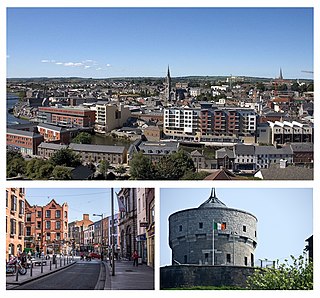
Drogheda is an industrial and port town in County Louth on the east coast of Ireland, 42 km (26 mi) north of Dublin city centre. It is located on the Dublin–Belfast corridor on the east coast of Ireland, mostly in County Louth but with the south fringes of the town in County Meath, 40 km (25 mi) north of Dublin city centre. Drogheda had a population of 44,135 inhabitants in 2022, making it the eleventh largest settlement by population in all of Ireland, and the largest town in the Republic of Ireland, by both population and area. It is the last bridging point on the River Boyne before it enters the Irish Sea. The UNESCO World Heritage Site of Newgrange is located 8 km (5.0 mi) west of the town.
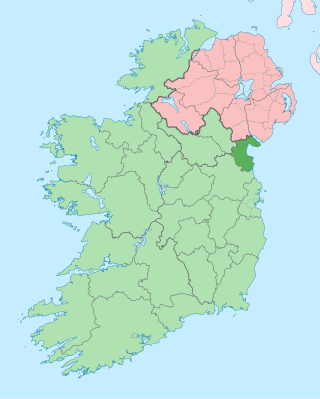
County Louth is a coastal county in the Eastern and Midland Region of Ireland, within the province of Leinster. Louth is bordered by the counties of Meath to the south, Monaghan to the west, Armagh to the north and Down to the north-east, across Carlingford Lough. It is the smallest county in Ireland by land area and the 17th most populous, with just over 139,100 residents as of 2022. The county is named after the village of Louth. Louth County Council is the local authority for the county.
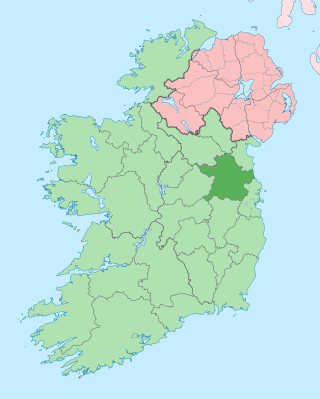
County Meath is a county in the Eastern and Midland Region of Ireland, within the province of Leinster. It is bordered by County Dublin to the southeast, Louth to the northeast, Kildare to the south, Offaly to the southwest, Westmeath to the west, Cavan to the northwest, and Monaghan to the north. To the east, Meath also borders the Irish Sea along a narrow strip between the rivers Boyne and Delvin, giving it the second shortest coastline of any county. Meath County Council is the local authority for the county.
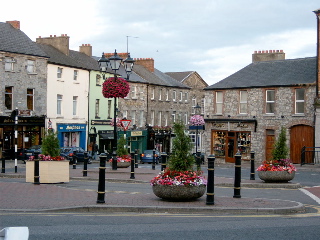
Navan is the county town and largest town of County Meath, Ireland. It is at the confluence of the River Boyne and Blackwater, around 50 km northwest of Dublin. At the 2022 census, it had a population of 33,886, making it the ninth largest settlement in Ireland. The town is in a civil parish of the same name.

Oliver Plunkett was the Catholic Archbishop of Armagh and Primate of All Ireland and the last victim of the Popish Plot. He was beatified in 1920 and canonised in 1975, thus becoming the first new Irish saint in almost seven hundred years.

Duleek is a small town in County Meath, Ireland.
Dunne or Dunn is an Irish surname, derived from the Irish Ó Duinn and Ó Doinn, meaning "dark" or "brown." The name Dunne in Ireland is derived from the Ó Duinn and the Ó Doinn Gaelic septs who were based in County Laois, County Meath and County Wicklow. These septs in turn are descendants of the O'Regan noble family. It is in these counties that the majority of descendants can still be found. Hundreds of years ago, the Gaelic name used by the Dunn family in Ireland was Ó Duinn or Ó Doinn. Both Gaelic names are derived from the Gaelic word donn, which means "brown". Ó Doinn is the genitive case of donn. First found in county Meath, where they held a family seat from very ancient times. Variations: Dunn, Dunne, Dun, Duen, O'Dunne, O'Doyne, Doine, Doin, O'Dunn.

Irish Catholic Martyrs were 24 Irish men and women who have been beatified or canonized for both a life of heroic virtue and for dying for their Catholic faith between the reign of King Henry VIII and Catholic Emancipation in 1829.
George Dowdall was a sixteenth-century Irish cleric, who was twice Archbishop of Armagh.

Kingscourt, historically known as Dunaree, is a town in County Cavan, Ireland. It is located near the Cavan–Meath border. The town was founded near the site of the old village of Cabra, by Mervyn Pratt, towards the end of the 18th century, and was completed by his brother, the Reverend Joseph Pratt. As of the 2022 census, the population was 2,955.
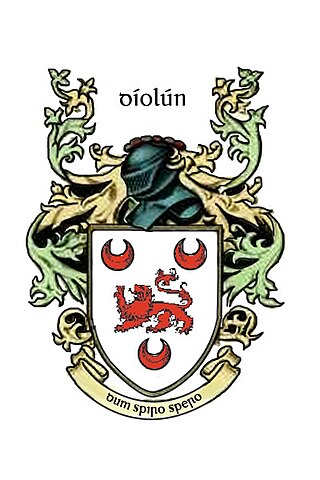
Dillon is an Irish surname of Breton origin, descending from a cadet branch of Viscomte de Leon in Northern Brittany. It first appeared in Ireland with the arrival of Sir Henry de Leon, in the service of Prince John in 1185. Sir Henry married Maud de Courcy, daughter of Sir John de Courcy and Affrica Guðrøðardóttir. Awarded large tracts of land by in Meath and Westmeath, one of the Dillons’ first Mott & Baileys can still be found at Dunnamona before the establishment of stone structures such as Portlick Castle.
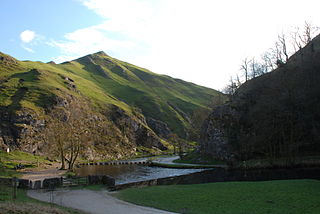
James Dowdall was a Roman Catholic merchant of Drogheda, Ireland. The Dowdalls of Louth originated at Dovedale in Derbyshire and became prominent in Ireland in the late Middle Ages.James Dowdall, the Lord Chief Justice of Ireland, who died in 1584, was a cousin of Dowdall.
The High Sheriff of Meath was the British Crown's judicial representative in County Meath, Ireland, from the conquest until 1922, when the office was abolished in the new Free State and replaced by the office of Meath County Sheriff.
Sir James Dowdall was an Irish judge of the Elizabethan era who briefly held office as Lord Chief Justice of Ireland. He should not be confused with James Dowdall, the Catholic martyr, who was his cousin.
Sir Robert Dowdall was an Irish judge who held the office of Chief Justice of the Irish Common Pleas for more than forty years. He is mainly remembered today for the murderous assault on him by Sir James Keating, the Prior of Kilmainham, in 1462.

Sir William Bathe was an Irish judge and landowner. He is commemorated by the Dowdall Cross in Duleek, County Meath, which was erected by his widow Janet Dowdall in 1601. He should not be confused with his much younger cousin William Bathe of Drumcondra Castle, who was a Jesuit and noted musicologist.

Athcarne Castle is a ruined Elizabethan castle outside the town of Duleek in County Meath, Ireland.

Athlumney Castle is a tower house and fortified house and a National Monument in Navan, Ireland.

The Louth county football team represents Louth in men's Gaelic football and is governed by Louth GAA, the county board of the Gaelic Athletic Association. The team competes in the three major annual inter-county competitions; the All-Ireland Senior Football Championship, the Leinster Senior Football Championship and the National Football League.
Robert Fitzrery was an Irish Law Officer, landowner and judge of the fifteenth century. He was a gifted lawyer, and also suggests a shrewd and acquisitive man of business.













